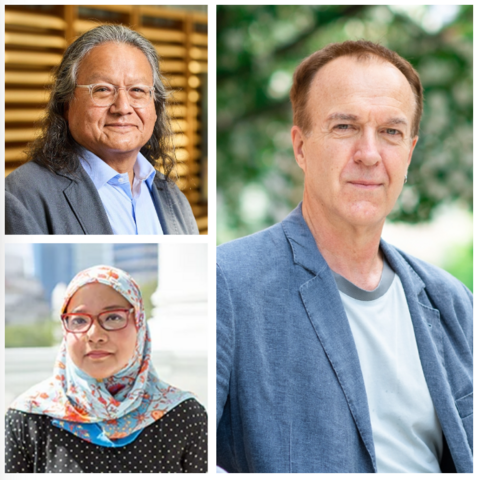Rob Nixon in conversation with Gerald Torres and Nurfadzilah Yahaya as part of the 2024 Tanner Lectures on Human Values.
Rob Nixon is the Currie C. and Thomas A. Barron Family Professor in the Humanities and the Environment at Princeton University. He is the author of four books, including Slow Violence and the Environmentalism of the Poor (Harvard), celebrated for its fundamental contributions to ecocriticism and the environmental humanities. Nixon is a frequent contributor to the New York Times, where he writes on environmentalism and on literature and culture from the global South. He has been awarded a Fulbright-Hays Fellowship, a MacArthur Foundation Peace and Security Fellowship, and a National Endowment for Humanities Fellowship. Nixon is currently working on a collection of essays on environmental justice in the Anthropocene.
Gerald Torres is Professor of Environmental Justice at the Yale School of the Environment, with a secondary appointment as Professor of Law at the Law School. A pioneer in the field of environmental law, Torres has spent his career examining the intrinsic connections between the environment, agricultural and food systems, and social justice. His research into how race and ethnicity impact environmental policy has been influential in the emergence and evolution of the field of environmental justice. His work also includes the study of conflicts over resource management between Native American tribes, states, and the federal government.
Nurfadzilah Yahaya specializes in history of Southeast Asia, Indian Ocean history, legal history, history of infrastructure, and environmental history. Her first book, Fluid Jurisdictions: Colonial Law and Arabs in Southeast Asia, demonstrates how colonial subjects entrenched European colonial legalities in British and Dutch territories in Southeast Asia by playing several jurisdictions against one another from the mid-nineteenth century onwards. Her current book project, “Overflow: History of Land Reclamation in the British Empire in the Twentieth Century,” lies at the intersection of environmental history, urban history, science and technology studies, legal history, and history of infrastructure.
